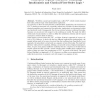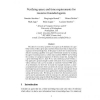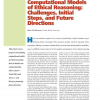109 search results - page 16 / 22 » On the difference between traditional and deductive fuzzy lo... |
127
Voted
FROCOS
2000
Springer
15 years 5 months ago
2000
Springer
We define a sound and complete logic, called FO , which extends classical first-order predicate logic with intuitionistic implication. As expected, to allow the interpretation of i...
111
click to vote
ITC
2003
IEEE
15 years 7 months ago
2003
IEEE
This paper describes a new post-silicon validation problem for diagnosing systematic timing errors. We illustrate the differences between timing validation and the traditional log...
125
click to vote
FSKD
2005
Springer
15 years 7 months ago
2005
Springer
Abstract. In the artificial neural networks (ANNs), feature selection is a wellresearched problem, which can improve the network performance and speed up the training of the networ...
ATAL
2006
Springer
15 years 5 months ago
2006
Springer
The effective reasoning capability of an agent can be defined as its capability to infer, within a given space and time bound, facts that are logical consequences of its knowledge...
120
click to vote
EXPERT
2006
15 years 1 months ago
2006
on abstract principles that you can't easily apply in a formal, deductive fashion. So, the favorite tools of logicians and mathematicians, such as firstorder logic, aren'...



